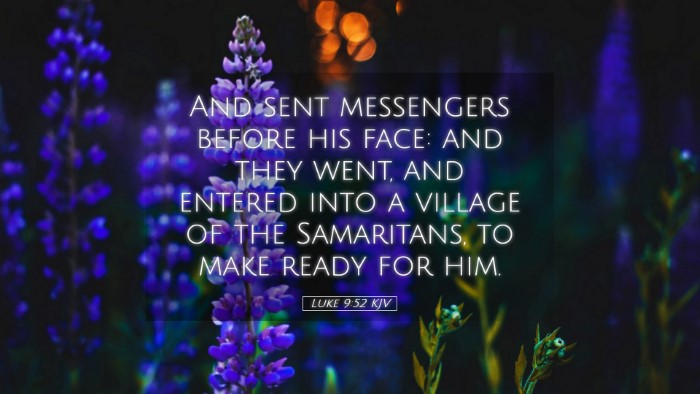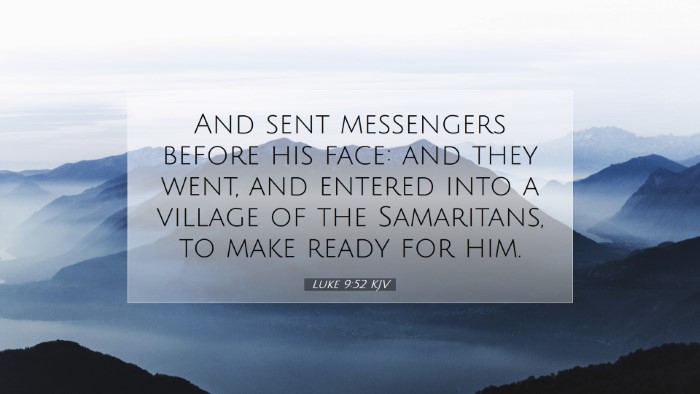Bible Commentary on Luke 9:52
Luke 9:52 (ESV): "And he sent messengers ahead of him, who went and entered a village of the Samaritans, to make preparations for him."
Introduction
The verse marks a pivotal moment in the ministry of Jesus, highlighting His approach towards the Samaritans and foreshadowing the expanding reach of His gospel.
Understanding this passage requires contextual insight regarding cultural interactions, theological implications, and the mission of Christ as depicted in the Gospel of Luke.
Historical Context
During Jesus' time, the relationship between Jews and Samaritans was fraught with hostility and animosity, reflecting deep-seated ethnic and religious divides.
As Matthew Henry observes, "The Jews had no dealings with the Samaritans," which sets up a significant backdrop for the mission Jesus undertakes in this verse.
Matthew Henry's Perspective
Henry emphasizes that Jesus' decision to send messengers to these villages signifies His commitment to breaking social and religious barriers.
His willingness to engage with the Samaritans reveals a love that transcends prejudice. According to Henry, "Christ came to save the lost, and therefore He stretches out His hand to those who were considered outcasts."
Albert Barnes' Commentary
Barnes notes that this preparatory act demonstrates strategic ministry. The sending of messengers was not merely a logistical move, but a spiritual endeavor, intending to open the hearts of the Samaritans to receive Him.
He comments, "It was necessary that He should have a place to receive Him, and represent the character of His mission to the Samaritans."
Adam Clarke's Insights
Clarke further delves into the implications of Jesus' ministry to the Samaritans. He correlates this act of sending messengers to the broader mission of evangelization that Jesus embodies.
Clarke notes, "This act reveals the forthcoming gospel's inclusivity and compels followers of Christ to reach out beyond cultural confines."
Theological Implications
This verse is not merely an account of preparation but a statement of purpose.
Jesus' ministry begins to actively dismantle barriers, urging His followers to adopt a broader vision of the Kingdom of God.
The Nature of Jesus' Mission
- Inclusivity: The act of sending messengers encompasses a radical inclusion, representing God's desire to reach every people group.
- Preparation: The preparation signifies that the people’s hearts must be prepared to receive the gospel—a theme echoed throughout the New Testament.
- Engagement: Jesus’ engagement with the Samaritans introduces a paradigm shift—inviting scholars to reflect on their own communities and biases.
Application for Pastors and Theologians
For pastors and theologians, this passage provides rich material for exploring the motives of outreach efforts.
Christ's example necessitates a complex response in contemporary ministry contexts.
Challenges in Ministry
As church leaders navigate the multitude of cultural backgrounds in their congregations, this text serves as a reminder of the call to transcend societal norms.
Henry’s commentary encourages leaders to embrace ‘the weak and the outcast’ as integral to the ministry of Christ.
Strategic Planning in Church Planting
Barnes’ insight on the necessity of preparation can be applied to strategic church planting and evangelistic efforts.
Leaders must consider ‘How are we preparing the way for Christ in our local context?’
Evangelism and Inclusivity
Clarke’s emphasis on inclusivity can serve as a cornerstone for developing congregations that reflect the diversity of the body of Christ.
This verse acts as a theological grounding for churches to reach out to marginalized and overlooked communities.
Conclusion
Luke 9:52 encapsulates a transformative moment in Jesus' ministry, emphasizing preparation, engagement, and a commitment to inclusivity.
By examining the perspectives of Matthew Henry, Albert Barnes, and Adam Clarke, we gain a multifaceted understanding of how this verse shapes our approach to ministry and faith today.
The implications call for introspection, innovation, and a renewed dedication to following Jesus’ model of reaching out to every soul—particularly those who have been marginalized.


